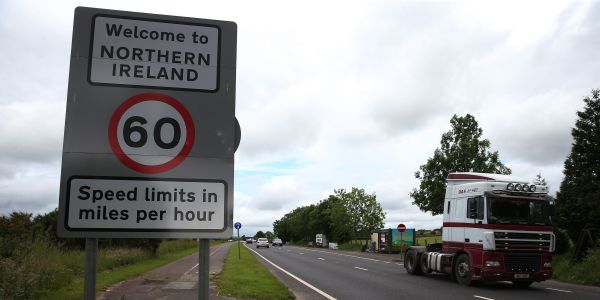The European Union will be sensitive to Ireland’s desire to preserve the “invisible border” and maintain close relations with post-Brexit UK, the Republic’s foreign minister has claimed.
Charlie Flanagan insisted other EU partners understood the nature and importance of the close link between Ireland and the UK.
In the wake of the referendum, concerns have been expressed on both sides of the Irish border that movement of trade and people will be negatively impacted when the UK leaves the EU. The future of the Common Travel Area (CTA), which has allowed people to travel freely around the island since partition, has been the subject of intense public debate.
While the governments in Dublin, Belfast and London have expressed a desire to keep the border as open as possible, the EU member states will ultimately have to agree to the shape of what will become of one of the Union’s external frontiers.
Addressing the Diplomatic Corp – Irish based ambassadors representing 75 countries – Mr Flanagan highlighted the “crucial role” the EU played in the peace process. He said while the contribution of the EU to reconciliation projects in Northern Ireland would be missed, he stressed that the peace that had been achieved would remain “embedded and irreversible”.
On Ireland’s National Day of Remembrance, the minister told the ambassadors: “Without doubt, the period ahead will be very challenging for the European Union as it seeks to ensure that the United Kingdom remains a close partner while at the same time working to deliver even more effectively on the priority concerns of its citizens.”
He added: “I have spoken to several of my EU counterparts in recent days and I will continue these conversations over the coming weeks. I know that our EU partners understand well the uniquely close nature of Ireland’s relations with the United Kingdom and that, in the spirit of accommodation which characterises the European Union, they will be sensitive to our concerns which include the exceptionally close relationship between these islands, the sharing of a land border, the unique status of our citizens in the United Kingdom and, of course, the implications for the peace process…”
Mr Flanagan said the Irish government “deeply regretted” the outcome of the referendum but respected the result.
“Today let me emphasise just one of the reasons for our deep regret,” he added.
“The context for the development of the warm relationship between our islands, which has transformed one of the great enmities of the past into a great friendship, has been our shared membership of the European Union over the last 40 years. I strongly believe that the foundations of this friendship are strong and it will endure.
“While also warmly recognising the immense contribution of the United States and of our other friends around the world, the European Union to a large extent provided the wider context for the peace process.
“One thinks, for example, of Europe’s immensely generous financial contribution over many years which went well beyond any objective allocation criteria, a contribution effectively from the taxpayers of other European countries to assist and support our peace process.
“However, that benign EU context was and is much more fundamental than money. The fact that Ireland and the United Kingdom shared a common EU citizenship provided a space for reconciliation that transcended the zero-sum equation of British or Irish sovereignty. The Irish Government does not underestimate the sense of disquiet now felt by many people in Northern Ireland at the prospect of the loss of their connection to the European Union.
“While it is therefore very important to understand and acknowledge the European contribution to the peace process, and to address the complications and challenges which will arise in the new situation, I haven’t the slightest doubt that the peace process is embedded and irreversible.
“The Irish Government will continue to work intensively with the British Government and the Northern Ireland Executive to see how best collectively we can work to ensure that the gains of the last two decades are fully protected.
“Ireland, Britain and Northern Ireland share the common objective of preserving the Common Travel Area and an open border on the island of Ireland. These are the types of issues we are highlighting and, in due course, will be discussing in detail with our EU partners as we seek together to design arrangements to protect the peace process.
“As we today remember the conflicts which have scarred the European continent and wiped out successive generations of its young men, destroying the lives of families everywhere as we commemorate the Somme both yesterday in Dublin and in France last week, it is uplifting to note the maturity and ease of political relationships in Europe today; relationships which would have seemed literally incredible to the men in the trenches a century ago.
“Diplomacy is often about the important challenge of promoting trade and culture; and about the crucial responsibility of looking after our citizens abroad. But sometimes diplomacy can actually be about life and death as it has proved on this continent and later on this island.”
